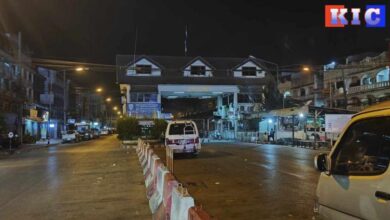Karen State Records 436 Dengue During Wet Season – Authorities Warn Community To Stop Dengue by Keeping House and Gardens Clean

The wet season in Burma is when dengue fever strikes communities. The Karen State public health department has diagnosed 436 people dengue fever as of July 14, 2018.
Among the recorded 436 cases, 306 were from Hpa-an, 35 from Kawkareik, 39 from Hlaingbwe, 20 from Myawady, 8 from Kyainseikkyi, 22 from Hpapun and 6 from Thandaung Townships.
Doctor Tun Min the head of the State Public Health department said.
“As it is the wet in season, mosquitos lay more eggs and their population increases causing higher rates of dengue infections. Dengue fever has four grades – grade 1 is the mildest and is the most common. Grade 4, also known as Dengue Hemorrhagic Fever (DHF) is when the patient has to seek hospital care. It is important to be cautious because grade 4 can be fatal.”
Dr. Tun Min said that the fever is common among children from 5 to 9 years old and there not been any deaths so far this year. The health department has been organizing and going around town every week to give larva repellant and using mosquito repellent (gas) to kill mosquitos, and heath education courses are given to each section and wards.
The Health Department warned that the children under 15-years-old who have high fever, rash, dark vomit (coffee color), low blood pressure need to seek urgent treatment at their nearest clinic or hospital.
Dr. Tun Min said that health worker alone cannot fight dengue and he urged public participation.
“The most important thing is public involvement. When water is stored with pots and brackets, they need to be covered so that mosquitos cannot lay eggs. The leftover water should be thoroughly cleaned. The flower vases should be changed regularly. The inside and surrounding area around the house should be cleaned and cleared of rubbish. The best way to stop dengue is to prevent the mosquitos from laying eggs.”
According to statistics from health department nationwide, dengue is common in populated Yangon, followed by Irrawaddy, and Tanintharyi Region.
The World Health Organization classifies dengue as “the fastest growing mosquito-borne disease, with almost half the world’s population now at risk” and “one of the leading causes of serious illness and death among children.”




